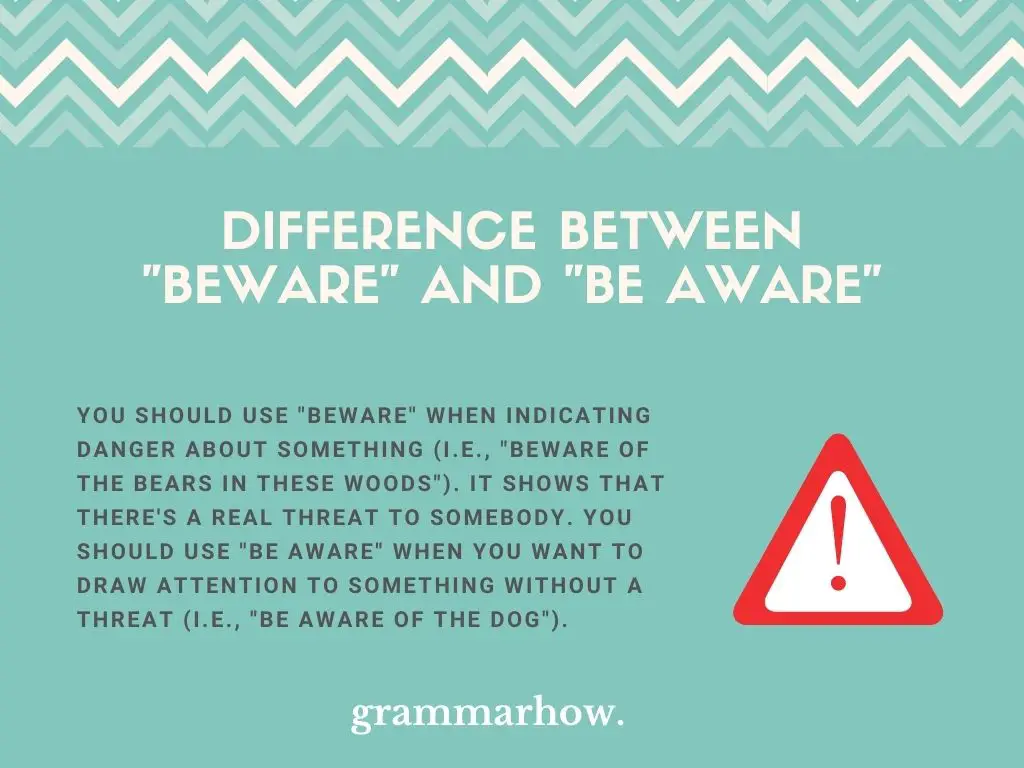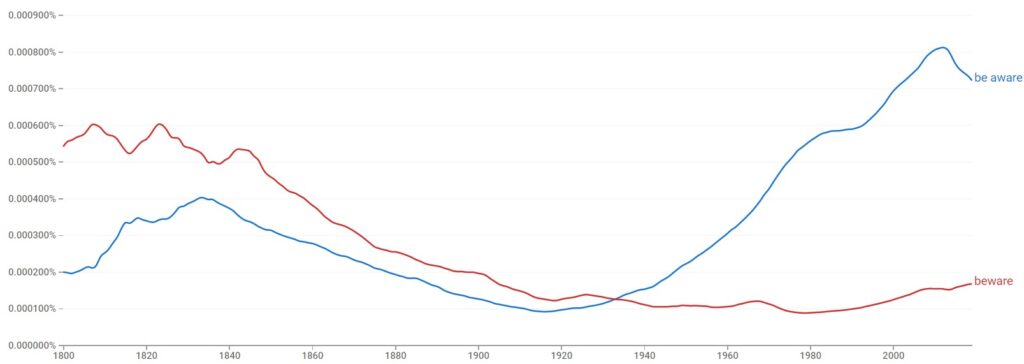The words “beware” and “be aware” are somewhat similar, but there’s a key difference you need to know about. This article will explain what that difference is and what you need to remember to make sure you’re using them correctly.
What Is The Difference Between “Beware” And “Be Aware”?
You should use “beware” when indicating danger about something (i.e., “beware of the bears in these woods”). It shows that there’s a real threat to somebody. You should use “be aware” when you want to draw attention to something without a threat (i.e., “be aware of the dog”).

The definition of “beware,” according to The Cambridge Dictionary, is “used to warn someone to be very careful about something or someone.”
The definition of “be aware,” according to The Cambridge Dictionary, is “knowing that something exists, or having knowledge or experience of a particular thing.”
“Beware” is always a warning, while “be aware” is merely a call to attention and doesn’t always signify anything dangerous.
Is “Beware” Or “Be Aware” Used The Most?
Of the two, it might help to see some statistics to work out which is used more in English. Sometimes, that helps us determine whether we should spend more time learning one of them over the other.
According to this graph, “be aware” is used more than “beware.” It’s become much more popular in the last few decades, while “beware” used to be more popular in the 1800s.

It seems that “beware” has lost a lot of popularity over the years. That might be due to the fact that people regard it as an older word that’s lost a lot of the impact it used to have today.
Examples Of How To Use “Beware” In A Sentence
While “beware” isn’t the most common of the two, it will still help you to know when it’s used. We’ve included some examples below to show you when “beware” works best.
- Beware along this footpath, as it has caused many travelers to fall to their doom.
- Beware of the dog. I can’t stop him from biting you if he wants to.
- Beware of the bears in these parts; they like to hunt.
- You should beware of the night in this city; there are many dangerous people around here.
- There’s a lot of electricity around here, so please beware.
“Beware” indicates that there is a direct danger to us. Usually, if we pay attention, we’ll be fine and won’t come across the danger, but someone says “beware” to warn us that the danger exists.
Examples Of How To Use “Be Aware” In A Sentence
Now let’s see how “be aware” is used in a different way. You might come across this one more often, so it’ll help to know when this one is more appropriate.
- Be aware of the dog in the house at night, he likes to hide in places, and I don’t want you to trip over him.
- Be aware that we’ll be making changes to the work schedule starting next week.
- Be aware that I’ve been paying close attention to your grades, and they need to change quickly.
- Be aware of your surroundings at all times; that’s the key to being a good martial artist.
- Be aware of everything that I tell you. That way, you’ll make sure you know what you’re doing.
“Be aware” draws our attention to something. It’s simply a way to show us that something exists and that we might have to act on it. There is usually not a threat involved when using “be aware.”
“Beware” And “Be Aware” – Synonyms
You might benefit from learning about some synonyms for the two words. That way, you don’t have to worry about getting them confused, and you can use one of these instead.
Beware Synonyms
- Danger ahead
- Be on your guard
- Look out
- Watch out
- Be wary
- Be careful
- Go with caution
Be Aware Synonyms
- Pay attention to
- Be conscious of
- Stay informed about
- Be mindful of
- Be familiar with
- Be smart about
- Pay close attention
Is “Beware” Formal?
“Beware” is a formal word, though it’s rarely used in formal situations because it connotes danger. It’s not often that you’ll talk about danger in any capacity in formal situations.
While the word works as a formal option, it’s not something we use. However, “be aware” is indeed a formal option, and it’s likely that you’ll come across it in many formal situations as well:
- Be aware that I’m holding a meeting about your behavior.
From the above example, we can see how we might use “be aware” in a formal situation. It’s used to highlight that something might happen in the future and our boss or colleague needs to draw our attention to it.
Which Is Correct: “Beware” Or “Beware Of”?
“Beware” is correct when used as a single word exclamation (“Beware!”). “Beware of” is correct when you want to indicate the danger and what is causing that danger (“beware of the dog” or “beware of the canyon”).
We use “of” as the preposition after “beware” when indicating what is causing the danger. Without it, we simply use “beware” as a single word exclamation, though it’s rare that you’ll come across it in this way.
Is “Be Aware” Two Words?
“Be aware” is two words, using “be” and “aware” to form the phrase. We use “be” to make sure people’s attentions are actively engaged, and “aware” means we’re bringing someone’s attention to a particular thing.
Are You Aware Of Or About?
After using “be aware,” it will help you to know which preposition comes next. While “beware” clearly needs “of,” we haven’t yet explained what “be aware” needs.
According to this graph, “aware of” is the correct preposition choice, and “aware about” is never used. This is commonplace in all of English, so it’s appropriate only to use “of” as the preposition.
- Correct: Be aware of these things, so you don’t make the mistakes again.
- Incorrect: Be aware about the changes around here.
- Correct: Be aware of your surroundings.
- Incorrect: Be aware about your family’s needs.
You may also like: “Beware” vs. “Be Aware” – Difference Explained (With Examples)

Martin holds a Master’s degree in Finance and International Business. He has six years of experience in professional communication with clients, executives, and colleagues. Furthermore, he has teaching experience from Aarhus University. Martin has been featured as an expert in communication and teaching on Forbes and Shopify. Read more about Martin here.
